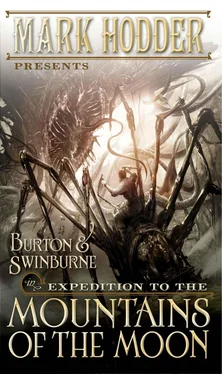Mark Hodder - Expedition to the Mountains of the Moon
Здесь есть возможность читать онлайн «Mark Hodder - Expedition to the Mountains of the Moon» весь текст электронной книги совершенно бесплатно (целиком полную версию без сокращений). В некоторых случаях можно слушать аудио, скачать через торрент в формате fb2 и присутствует краткое содержание. Жанр: sf_stimpank, на английском языке. Описание произведения, (предисловие) а так же отзывы посетителей доступны на портале библиотеки ЛибКат.
- Название:Expedition to the Mountains of the Moon
- Автор:
- Жанр:
- Год:неизвестен
- ISBN:нет данных
- Рейтинг книги:5 / 5. Голосов: 1
-
Избранное:Добавить в избранное
- Отзывы:
-
Ваша оценка:
- 100
- 1
- 2
- 3
- 4
- 5
Expedition to the Mountains of the Moon: краткое содержание, описание и аннотация
Предлагаем к чтению аннотацию, описание, краткое содержание или предисловие (зависит от того, что написал сам автор книги «Expedition to the Mountains of the Moon»). Если вы не нашли необходимую информацию о книге — напишите в комментариях, мы постараемся отыскать её.
Expedition to the Mountains of the Moon — читать онлайн бесплатно полную книгу (весь текст) целиком
Ниже представлен текст книги, разбитый по страницам. Система сохранения места последней прочитанной страницы, позволяет с удобством читать онлайн бесплатно книгу «Expedition to the Mountains of the Moon», без необходимости каждый раз заново искать на чём Вы остановились. Поставьте закладку, и сможете в любой момент перейти на страницу, на которой закончили чтение.
Интервал:
Закладка:
They were not friendly.
Tribute was demanded, haggled over, and finally paid in the form of two doti of cloth and some much-prized sami-sami beads.
The safari continued, meandering past fertile fields of rice, maize, and manioc before coming up against a snarled and riotous jungle, which they were still hacking through when the rains started. They eventually stumbled out of it, soaked to the skin and covered with ticks, and found themselves amid fetid vegetation from which misshapen dwarf mango trees grew, and in this unlikely spot-Tumba Ihere-they were forced to establish their camp.
That evening, in the main Rowtie, Isabella Mayson announced that she was feeling out of sorts. By the morning she was trembling with ague and hallucinating that ravenous birds were trying to peck out her eyes. Swinburne gave up his stretcher for her.
“I have developed a horror of the horizontal!” he declared.
“Sit on your mule,” Burton instructed, “and don't overexert yourself.”
The explorer ordered the commencement of the next march.
“Kwecha! Kwecha!” Said bin Salim and his Askaris yelled. “Pakia! Hopa! Hopa!” Collect! Pack! Set out! Safari! A journey! A journey today!
So began the third day of their hike.
Pox made the daily flight eastward and back again. The report was not good. A ship had delivered two thousand Prussian reinforcements to Mzizima. The Daughters of Al-Manat had divided into two groups of ninety women, one continuing to wage a guerrilla campaign against the burgeoning town, the other harassing a contingent of men that had set off in pursuit of Burton's expedition.
“We have to move faster,” the king's agent told Said.
“I will do all I can, Mr. Burton,” the ras kafilah promised in his habitually polite manner, “and the rest is as Allah wills it.”
They tramped through alternating bands of richly cultivated land and matted flora, with Said's Askaris forcing the porters to a brisk pace wherever possible, until they eventually found themselves in a large forest of copal trees that oozed resin and filled the air with a cloying perfume. Horseflies attacked them. Thomas Honesty was stung below the left eye by a bee and the side of his face swelled up like a balloon. Trounce started to feel a stiffness in his limbs. For an hour a strange whistling noise assaulted their ears. They never discovered its source.
They kept going.
About noon, Burton-who'd succumbed to the turgid heat and was gazing uncomprehendingly at the back of his mule's head-was roused by Swinburne, who, in his piping voice, suddenly announced:
“The dense hard passage is blind and stifled
That crawls by a track none turn to climb
To the strait waste place that the years have rifled
Of all but the thorns that are touched not of time.
The thorns he spares when the rose is taken;
The rocks are left when he wastes the plain.
The wind that wanders, the weeds wind-shaken,
These remain.”
“What?” Burton mumbled.
“Police pottery,” Swinburne replied. “Do you remember Matthew Keller in Leeds? Feels like a long time ago, durn't it?”
“I'm losing track,” Burton replied. “Since we left the Orpheus , I've been forgetting to record the date in my journal. I don't know why. It's out of character.”
He squinted against the glaring light and for the first time realised that the forest had been left behind; they were now traversing broad grain fields. He recognised the place-he'd passed through it during his previous expedition.
“We're approaching the village of Muhogwe. Its people have a reputation for violence but last time I was here they settled for mockery.”
William Trounce cleared his throat and said, “My apologies, Richard.” He slipped to the ground.
It was another case of seasoning fever.
“We're succumbing considerably sooner than I expected,” Burton said to Sister Raghavendra as they lowered the police detective onto a litter.
“Don't worry,” she replied. “There's usually a fairly long incubation period with this sort of affliction but the medicine I've been feeding you negates it. The stuff brings on the fever more rapidly, makes it burn more fiercely, and it's all over and done with in a matter of hours instead of weeks.”
Burton raised his eyebrows. “I should have liked that during my previous expedition!”
They came to Muhogwe. It was abandoned.
“Either the slavers have taken the entire population, or the entire population has upped and moved to avoid the slavers,” Burton observed.
“The latter, I hope,” Swinburne responded.
Beyond the village it was all jungle and forest again, then a quagmire where they had to fire their rifles into the air to scare away a herd of hippopotami.
A slope led up to a plateau, and here they found a boma -a fenced kraal-and decided to set up camp. No sooner had they erected the last tent than the clouds gathered and the rain fell.
They ate and rested, except for Burton who braved the downpour to take stock of the supplies. He found that two more porters had run away and three bundles of specie were missing.
Night came. They tried to settle but the air smelled of putrefying vegetation, the mosquitoes were remorseless, and they all felt, to one degree or another, ill and out of sorts.
Hyenas cackled, screamed, and whined from dusk until dawn.
And so it went. The days passed and the safari crept along, seemingly at a snail's pace, and wound its way over the malarious plain of the Kingani River toward the low peaks of the Usagara Highlands. Each in turn, they came down with fever then made an astonishingly rapid recovery. Burton was in no doubt that Sister Raghavendra was a miracle worker, for there could be no greater contrast than that between his first Nile expedition, during which he and John Speke had been permanently stricken with an uncountable number of ailments, and this, his second, where illness was the exception rather than the rule.
Isabel's reports came every morning. A force of four hundred men was now following in the expedition's tracks. The Daughters of Al-Manat were making daily attacks against them but nine more of her followers had been killed and the distance was closing between the two groups.
“If we can just make it to Kazeh before they catch up,” Burton told his friends. “The Arabians there are well disposed toward me-they will loan us men and weapons.”
They trudged on.
Plains. Hills. Forests. Swamps. Jungle. The land challenged their every step.
Sagesera. Tunda. Dege la Mhora. Madege Madogo. Kidunda. Mgeta. The villages passed one after the other, each demanding hongo , each whittling away at their supplies.
Desertions. Theft. Accidents. Fatigue. The safari became ever more frayed and difficult to control.
One night, they heard distant gunshots.
They were camped at Kiruru, a small and semi-derelict village located deep in a plantation of holcus, whose tall, stiff canes almost completely hid the ragged beehive huts and slumping bandani.
Herbert Spencer, freshly wound up, had been explaining to them some of his First Principles of Philosophy when the crackle and pops of rifle fire echoed faintly through the air.
They looked at each other.
“How far away?” Thomas Honesty asked.
“Not far enough,” Maneesh Krishnamurthy grunted.
“It's from somewhere ahead of us, not behind,” Burton noted.
“Lardy flab!” Pox added.
“Sleep with your weapons beside you,” the explorer ordered. “Herbert, I want you to patrol the camp tonight.”
“Actually, Boss, I patrol the camp every blinkin' night,” the philosopher answered.
“Well, with extra vigilance tonight, please, and I think Tom, William, Maneesh, Algy, and I will stand shifts with you.”
Читать дальшеИнтервал:
Закладка:
Похожие книги на «Expedition to the Mountains of the Moon»
Представляем Вашему вниманию похожие книги на «Expedition to the Mountains of the Moon» списком для выбора. Мы отобрали схожую по названию и смыслу литературу в надежде предоставить читателям больше вариантов отыскать новые, интересные, ещё непрочитанные произведения.
Обсуждение, отзывы о книге «Expedition to the Mountains of the Moon» и просто собственные мнения читателей. Оставьте ваши комментарии, напишите, что Вы думаете о произведении, его смысле или главных героях. Укажите что конкретно понравилось, а что нет, и почему Вы так считаете.












